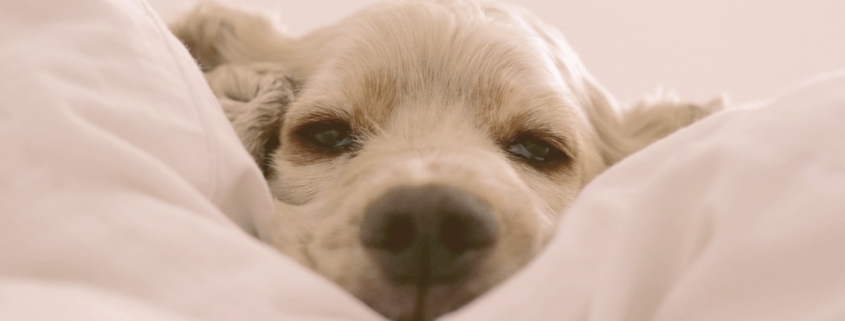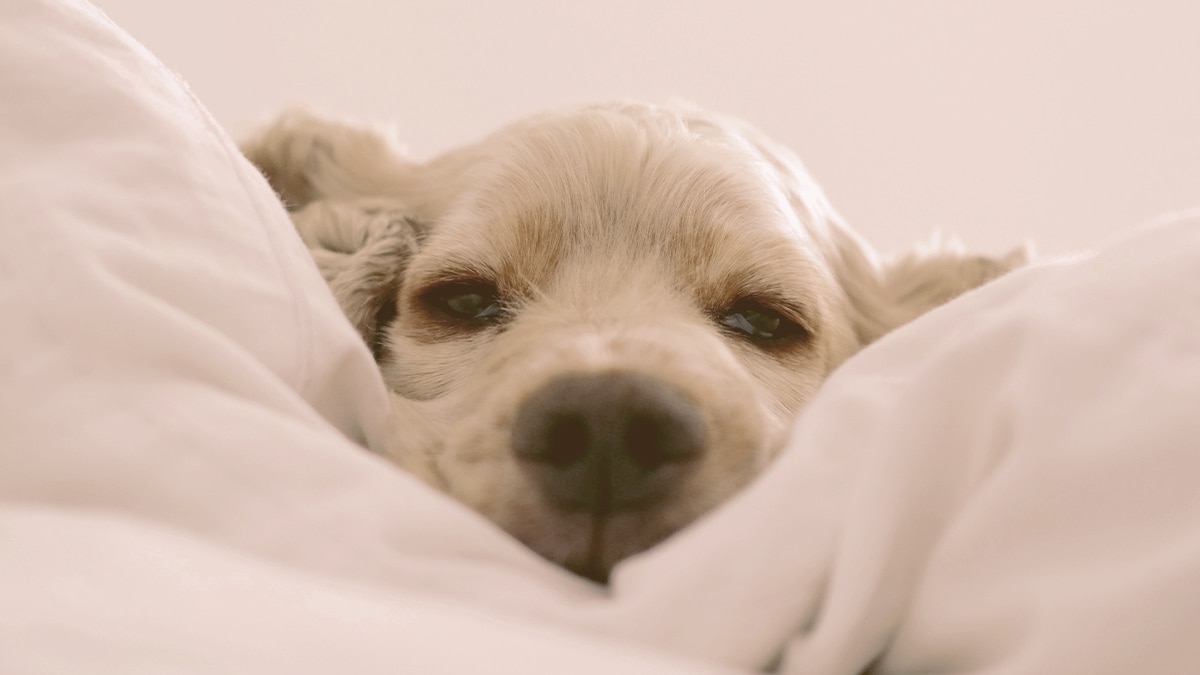
Why Does My Dog Sleep On My Pillow? 11 Common Reasons
Alex Vicente • Updated on August 1, 2023
- This review contains affiliate links. Read more here.
- Not a substitute for professional veterinary help.
Dogs are animals that naturally live in a pack society.
That is why they fit with human families and understand human relationships so well.
We think of our dogs as family members. They think of us as pack members.
When you are confused or annoyed by your dog’s behavior, it helps to remember that their behaviors are normal for their pack instincts.
It’s impossible for us to ask our dogs what they’re thinking.
We can only analyze their behavior and compare it to what research has discovered about natural canine society.
Some dog owners have no problem sharing their pillow with the dog.
They find it comforting to have the companionship of their best friend as they rest for the night.
Other dog owners seek to stop this behavior.
Here are 11 possible reasons that your dog loves to share your pillow with you, and what you can do about it.
Table of Contents
Your Dog Loves To Be With You
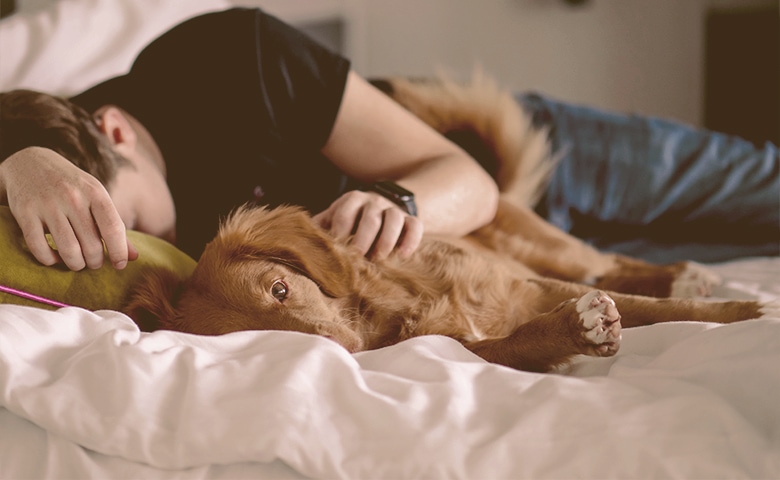
This is probably the most common reason that your dog loves your pillow. Dogs are companion animals through and through. Your dog loves to be near you. You probably notice that the dog tags around with you during the day. When you sit down, here comes the dog.
You’ll notice that your dog makes every effort to be with you at all times. You may take your dog with you on car trips whenever possible. This instinct to be close does not stop at night. During the night, this instinct to be a companion is amplified for the dog.
Of all the time that your dog can get undivided time with you, it is while you sleep. The dog is not unhappy that you’re asleep. It is simply happy that you’re not going anywhere. It can be close, in undisturbed relaxation with you for many hours.
Many dog owners also enjoy this particular companionship and welcome the comfort of having the dog close at night. Dog owners can also feel that they don’t get enough time during the day with their special companion, and value that sleeping time with the dog.
You Lay Your Head On Your Pillow
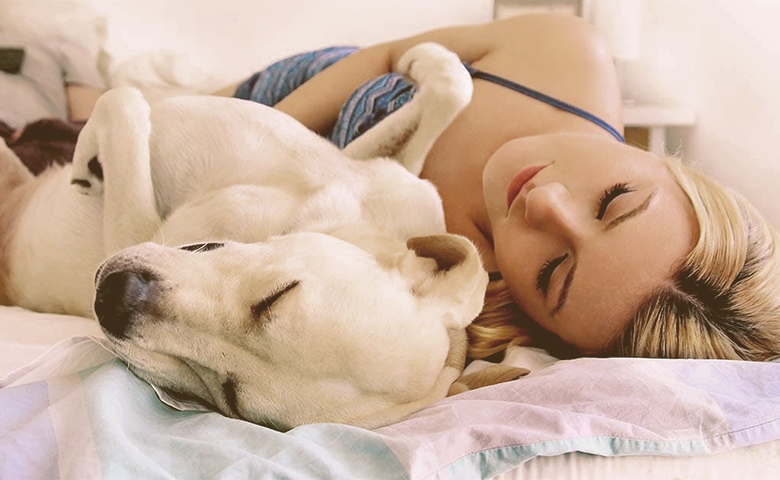
Dogs are smart. Most dogs are quick and easy to train for complex tasks involving reasoning skills and the ability to draw a conclusion and then act. This does not happen only with professional dog training. Dog owners train their dogs to behave in all kinds of ways. Some are good and charming, others become bad habits and behaviors.
When your dog is allowed to sleep in the bedroom with you, it is observing the bedtime ritual. You may even provide a soft bed for the dog, but it will notice the difference between its bed and yours. It is not surprising that it will not want to lay on the floor while you are elevated in the cozy bed.
Your dog sees that you lay on the bed, with your body under the covers and your head on the pillow. Don’t be surprised that your dog desires to do the same. Dogs are smart enough to associate bedtime with the sleeping-in-bed position.
When your dog does this and other human-like activities such as grabbing a leash, opening a door or greeting with a handshake, it is a gentle and fun reminder that our canine companions are enthusiastic partakers in human life.
Dog Likes The Smell Of Your Pillow
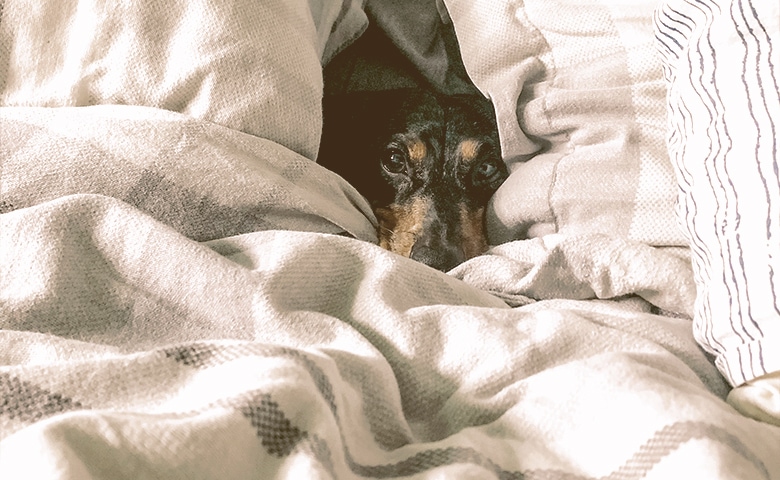
Your pillow smells like your head and face. Dogs are very familiar with those smells. A dog has two different air passages in its nose. One for breathing, and one for smelling. This means that the dog is able to retain and process smells with accuracy that is not disturbed by the process of breathing.
The dog’s nose is up to 10,000 times more receptive to smells than the human nose. So, when your dog is laying on your pillow, smelling what you’ve left behind, those smells are full of memories and feelings for the dog. Your dog is processing the events, tastes, and feelings associated with those smells.
As you can imagine, this is incredibly reassuring for the dog. Considering that you are a pack member for the dog, these smells are part of the sense of belonging that the dog has with you. If your dog is anxious to be in your face all night, it may be because it is not receiving the amount of face-to-face time with you that it needs during the day.
Dog Is Reassured By The Presence Of Your Pillow
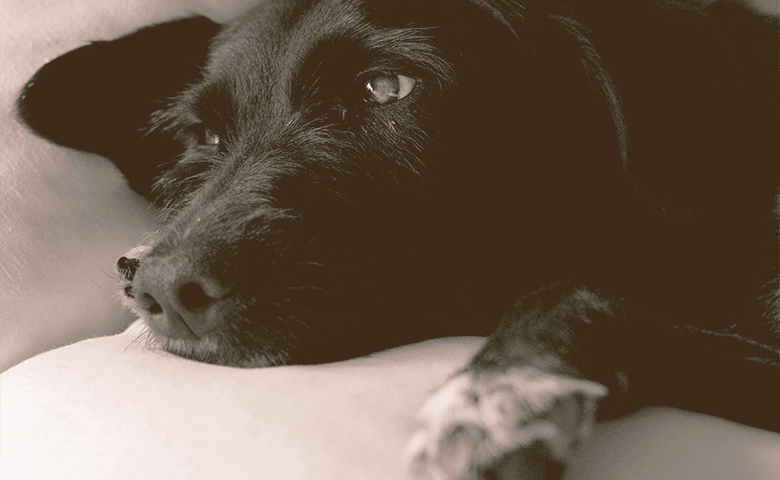
Many dog owners allow the dog to reside in the house while they are away for the day. They know that this offers the dog a great sense of comfort and security. It gives them a sense of belonging and safety while their human companions are away.
However, it is a common frustration for dog owners to come home after a long day at work to find the dog in their bed, sleeping on their pillow. Especially dog owners who make efforts to keep the dog in its own bed may find this offensive or unsanitary.
Keeping in mind the dog’s sense of smell, it is easy to interpret this action by the dog. When you are gone at work, the dog feels very alone. This loneliness is not present when the dog is in a pack as it would be naturally.
When the dog lays on your pillow, it is reassured by your smell. It is able to relax better and it helps stave off the loneliness brought on by your perpetual departure for the day. Allowing the dog to rest in this security lessens the odds of it engaging in destructive behaviors such as soiling the home or tearing up furniture.
The Dog Follows Your Leadership
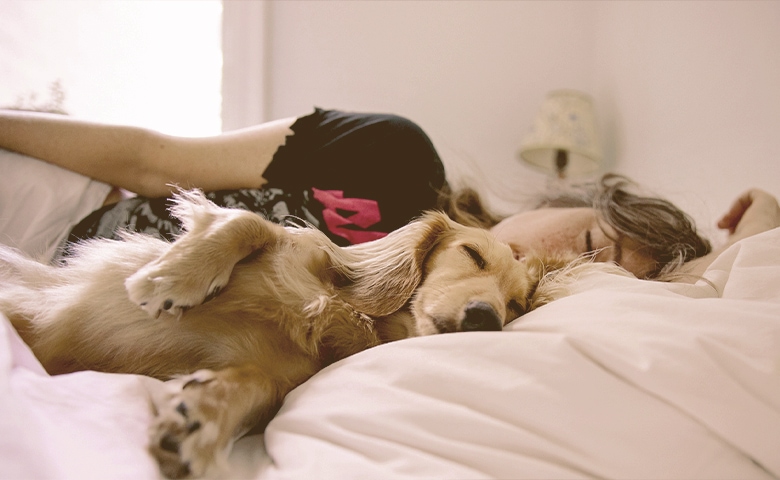
Does the dog mimic you all day long? Do you notice that when you eat it signals that dog to desire food as well? When you head outside, the dog assumes that it will follow? Maybe when you grab your car keys, the dog immediately gets ready to jump in the car.
These behaviors are not simply mimicking behaviors. This is behavior that is linked to your status in the pack. If you are a single person with a single dog, then the dog will likely see you as the pack alpha and assume your leadership in everything.
This means that when you lay your head on your pillow to sleep, the dog will follow suit as a gesture of loving obedience. This is especially true if the dog follows after you. Your dog is waiting for cues from you to suggest what its next appropriate behavior should be. Once it is clear what you are doing, your dog will follow suit.
Your Dog Is The Alpha
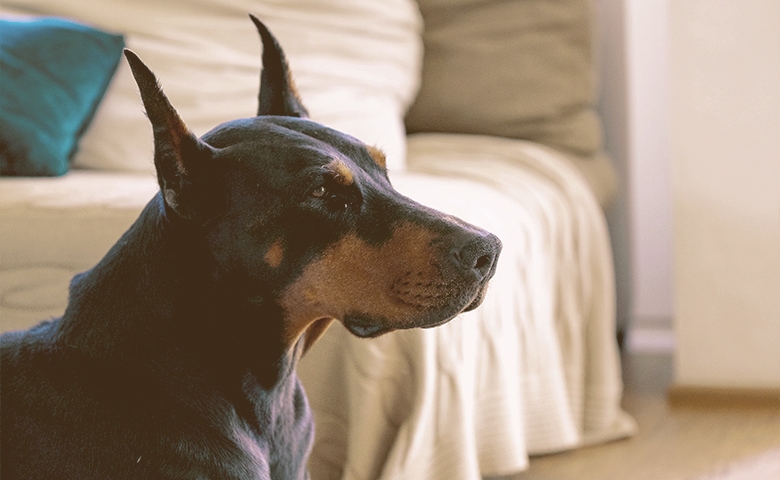
Some dogs work hard to establish the alpha position in the household, even with single owners. This can generate very destructive and manipulative behaviors on the part of the dog. Owners who find themselves relegated to the beta position can feel like the dog is running the home.
These owners find retributive damage in the home or to personal belongings when the dog disapproves of an action they have taken. They find that the dog is less companionable and more demanding. This relationship is backward and is actually less reassuring for the dog.
Owners who find that the dog races them to the pillow, or even pushes them off of the pillow should consider dog training. This may be indicative of a backward alpha relationship that has symptoms elsewhere in the home or relationship.
Setting healthy, reassuring boundaries for behavior and interaction is necessary. A dog that is left to do whatever it pleases becomes imbalanced and aggressive. Consult a certified dog trainer to discover ways to gently train your dog to be a valuable member of the family.
Your Alpha Dog Is Marking
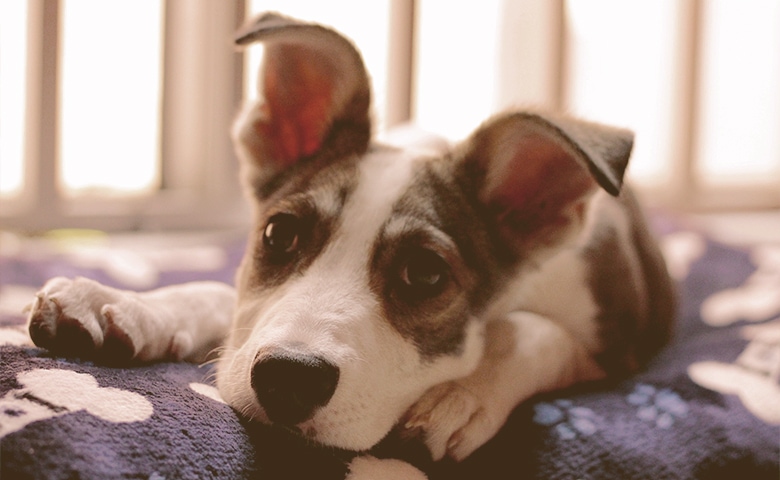
Dogs can be notorious for marking everything in sight. One behavior that is often not recognized as marking is rolling and laying on items. These actions both transfer the dog’s smell onto the pillow as well as transferring smells from the pillow to the dog.
If you find your dog is actively rolling around and sniffing the pillow, this is likely what it is doing. This can be a sign that the dog sees itself as being a rung above you on the canine status ladder.
If the dog’s other behaviors are not troublesome, and you don’t mind the dog rolling and laying on your pillow, then nothing to worry about. However, if the dog is also soiling other areas of the home or acting aggressively toward other family members, it would be worthwhile to seek the help of a certified dog trainer.
The Dog Shares One Partner’s Pillow But Not The Other
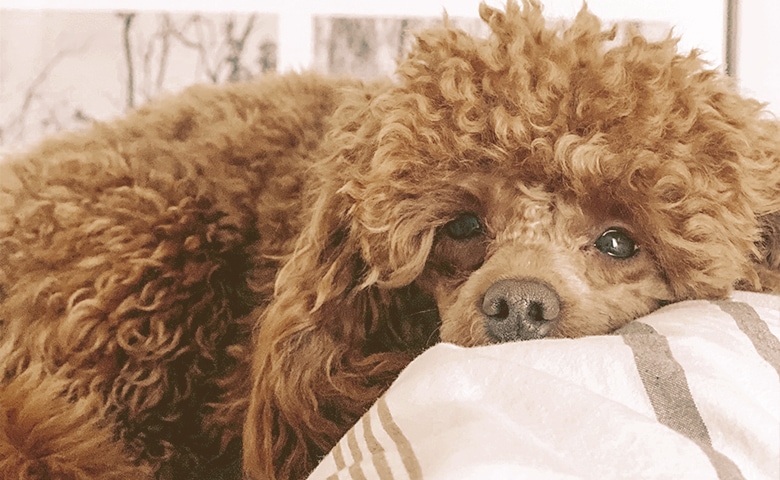
Dogs have a strict alpha pack mentality. When a family owns a dog, the dog works very hard to figure out its place in the pack. If it achieves alpha status over the entire family, it is very difficult to manage the relationship with the dog. Each family member may have a different complaint about dog behavior.
When a dog sleeps in the bed with a couple, they may find that it pushes them both off of their pillows, or possibly only one partner loses the sleeping position. This demonstrates the dog’s impression of who is more important.
The partner who sleeps most peacefully with the dog is likely considered to be the most dominant “dog” of the pack. This isn’t necessarily a bad thing, since there can be only one alpha in the pack, but it can be frustrating if the dog sees itself as the beta animal and the rest of the family as lessers.
It can show obedience to one family member while the rest of the family receives destructive and retributive behaviors. For instance, the dog may be happy to share mom’s pillow, but goes and urinates on the son’s pillow or bedding. This kind of behavior shows a need for the entire family to engage in professional dog training.
Dog Thinks The Pillow Is Soft
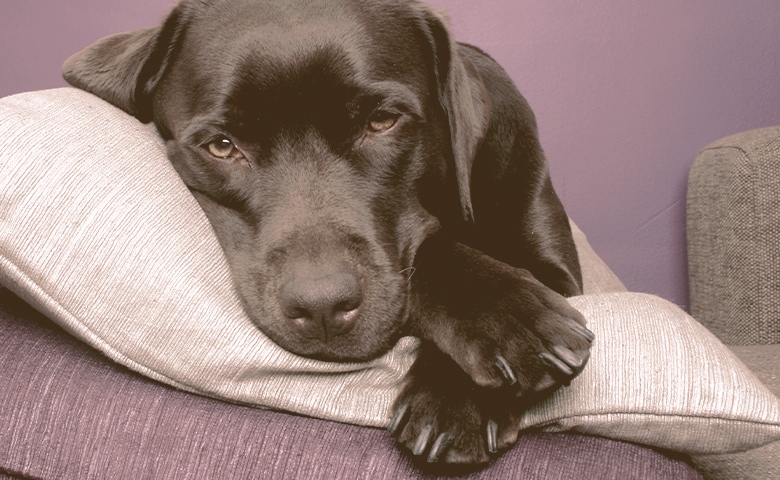
The dog loves your pillow for the same reason you do. It’s one of the softest, most comforting places in the entire house. Add the fact that it’s covered with comforting smells, and it’s no wonder that the dog wants to take a snooze on it whenever possible.
You may find your dog scratching at it to fluff it up, or tugging the blankets up and around the pillow to make it more comfortable. This is understandable because the dog simply has the same reasoning behind these actions as you do. To get more cuddly and settle in for that long rest that feels so refreshing.
Some dogs will go so far as to lay under the blankets and pull them up before settling down into the fluffy pillow. This behavior seems comical to humans, as it mimics our own use of the bed so well.
Some dogs understand this need for comfort, security, and warmth so well that they will even cover up other dogs, or human babies with blankets to maximize warmth and safety.
Dog Wants To Protect You
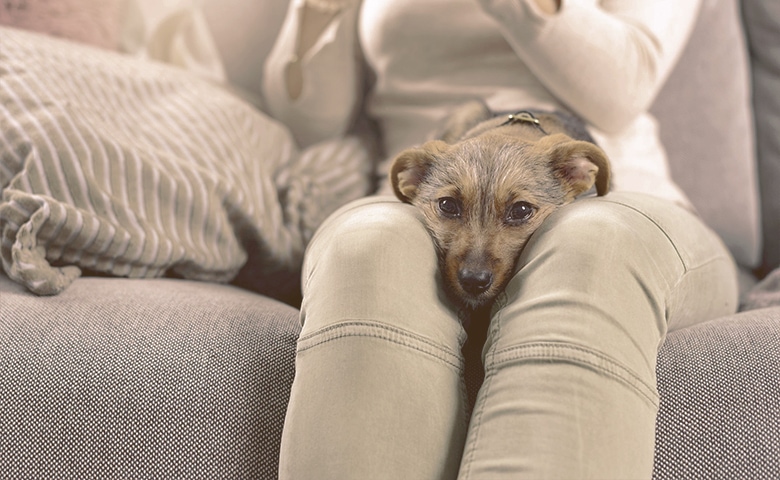
Your dog is the most safety-conscious and circumstance-aware member of your household. If you bought a dog for security, then you are well aware of the benefits that the dog provides for in-home security.
Some people purchase a dog simply for companionship and don’t realize that this dog is just as anxious for the safety and welfare of the family as a trained guard dog. This anxiety can be misplaced and result in yapping and aggression.
When it comes to nighttime sleeping, your dog knows that huddling together is the best way for the pack to achieve protection. Your dog is also confident that it is able to best protect you if you are together all night long.
Dog Doesn’t Want To Feel Lonely
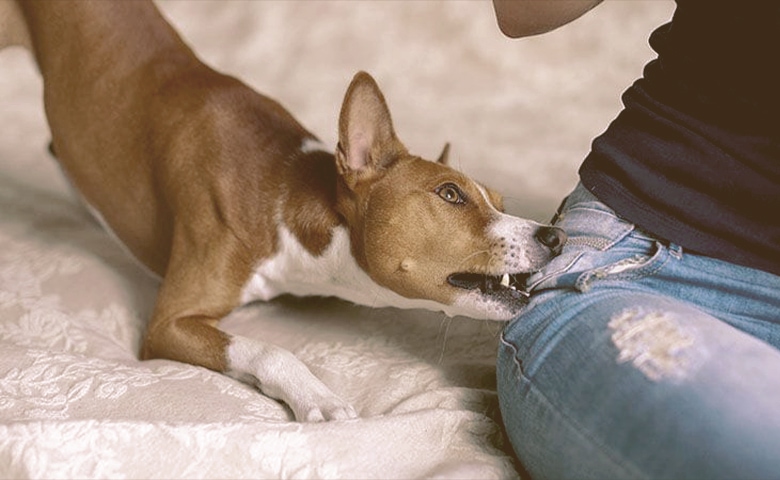
Dogs that are given more constant, reliable companionship, such as being together with at least one human companion all day long, will feel more confident in being near, yet in a separate bed for the night.
When the humans that the dog relies upon for pack companionship, safety, and status spend the majority of activity hours away from home, the dog can understandably feel nervous and unsure of his safety.
Aside from creating situations where dog misbehavior is much more likely, this also creates a deeper need for the dog to feel close companionship whenever possible. That is likely to be during the night, on your pillow.
Dogs that are raised with other dogs for companionship will feel a deeper affinity for the other dogs and are more likely to happily spend the night in the dogpile rather than the human’s bed. These dogs tend to get in more trouble together, and also feel less of a responsibility to the human since they will establish their own pack status.
Dogs Feel Separation Anxiety Too
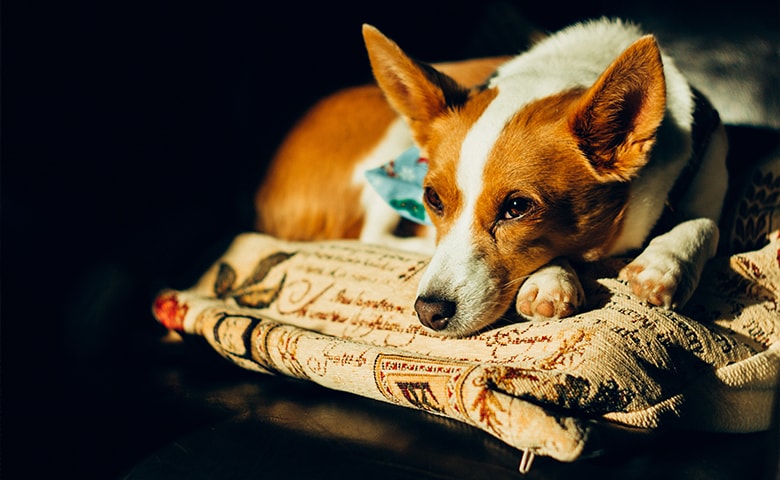
Just like human children, dogs need constant reassurance that they’re loved and accepted. The family unit is their pack. They feel a part of the group. Most families also accept the dog as a family member.
However, when the humans leave the home every day for work and school, the dog is usually left alone in the home. Some dogs learn to accept this and seem to enjoy the time to sleep the day away.
Other dogs feel very anxious about being left alone. This anxiety comes out in various ways, such as chewing, soiling the flooring, and other destructive behavior. Other times, this is demonstrated through excessive clinginess and jumping excitement when the humans arrive back at home.
Many dogs choose to sleep on the owner’s pillow during the daytime to relieve this separation anxiety. For many dog owners, this is a much more acceptable reaction to anxiety than other demonstrative behaviors. When you understand that your dog is feeling anxiety, you can find ways to be reassuring and avoid bad behavior.
Dog Needs To Feel Safe
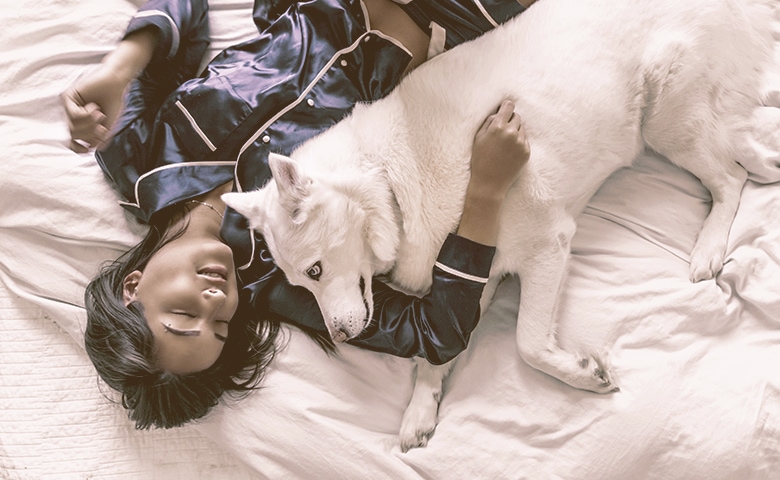
The dog knows that safety is a group effort. While the dog may feel a deep responsibility to keep you safe, it also knows that your proximity is its best bet for safety if something happens during the night.
This instinct to sleep together for safety is deeply ingrained in every canine. This does not go away with breeding, but it can be gently trained to less aggression. It is advised that dog owners work with a trainer to learn ways to gently reassure the dog and train it to feel more confident on its own without generating aggression.
Dogs that are neglected, bullied or allowed to establish dominant status over family members develop incredibly aggressive and destructive behaviors. These behaviors are completely avoidable. These behaviors are simply the dog’s only way to mitigate a situation where it feels helpless to protect itself without outright aggression.
Keep in mind that as much as you love your dog, it loves you much more, by nature. These animals are naturally affectionate and inclusive. That’s why we value their companionship so deeply. It is most important that you assure your dog that they are valued, loved, cared for, protected, and enjoyed every day.
Sources
Why Do Dogs Have Such a Great Sense of Smell?
Why Does Your Dog Like to Sleep on Your Pillow?
Dominance & Pack Behavior in Dogs

